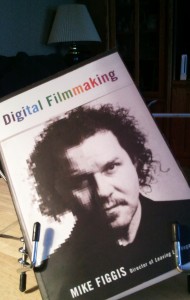Here are some quotes from the handy book, “Digital Filmmaking by Mike Figgis.
I really found his first person account of the transition from film to digital (Figgis made “Hotel” and “Leaving Las Vegas” and so many other movies that don’t get named as often) to be one of the best descriptions of not just what’s being done in the industry, but what each of us can do right this moment with what most of us already have!
“Mike Figgis is a man who lives and breathes the cinema… While most filmmakers are content to plod their dreary way from one foregone conclusion to another, Figgis is out there on the edge, joyously pulling off cockamamie stunts.” — Roger Ebert.
Ten years ago the professional camera was entirely out of reach to anyone other than millionaires. And now we have these things that are almost disposable.
One of the great film composers, Morricone, formulated a list of advice to filmmakers and composers. He advised that you should not change the key of your piece of music unless you have a real good reason to — because when you change the key, it makes the audience think something else has changed. the function of music is to UNDERSCORE. We use the word ‘score,’ but what we really mean is ‘underscore.’ The score should not lead but support the film, adding tension and emotional subtlety. It is UNDER the film. I have a huge problem with a lot of scores that I hear, which are definitely not under – they are OVER the film.
Opposed to this is making a digital film, where you should sort of infiltrate yourself into a natural environment, and not try to change it. You don’t stop the traffic, you don’t highlight your presence, you don’t put up a big neon sign announcing the film. It’s rather like taking a stills photograph — in a subtle way, after a while people don’t seem to see you anymore because you’re not shouting, ‘We need silence now!’ Or, ‘Stop the traffic!’ and the director’s not screaming, ‘Who let that person through?’ You just observe the environment sufficiently to knkow where to put the camera, and then you let the environment continue. The actors are then reacting to natural phenomena rather than fake phenomena.
I will never see my footage as an object — a can of film, a tape in a case, a reel of sound, a negative of a still image. Those formats are all poised to disappear. This makes me feel insecure, and I have resorted to spending days making back-up copies of all my information. I have had no choice but to become an obsessive filing clerk. I make three copies of everything I generate, and then I deposit each of the three at a different location. Why? Because in my deeply superstitious pagan mind, I have the notion that otherwise it could vanish without a trace.
What happens in America with mainstream films is that they test the film, and if it doesn’t test very well, the first thing that will be blamed will be the music — hence the hysteria of adding louder and louder strings and making a bigger noise. Maybe the answer would be to take the music off altogether and then test the film, and afterwards start gently adding it back in.
It was Sony, the great innovator, who came up with DAT – digital audio tape, a tiny but highly sophisticated tape. The first record-and-playback DAT machines were very well made, very robust, professional machines, not cheap but not fearfully expensive. And almost immediately the industry accepted it: DAT became THE format for mastering sound. Certain engineers whom I talked to at the time were horrified. ‘The quality’s great, but where’s your security? This is a tiny piece of tape in a plastic box…’ — whereas before, you were using really big four-inch-wide master tapes. DAT wasn’t invented as something to take over as the mastering format for recorded sound, but that’s the way innovation works.
…it means you can shoot at very low shutter speed, plus you can change the aperture to make a very high-contrast black and white image. Which means you can virtually shoot in the dark.
[MY THOUGHT: when I read that; Maybe the jump from 8 to super8 was bigger than any other technological advance yet, except maybe DAT]
—————————————————————————
So yes, these quotes are all over the place, they’re just the pieces which struck me the hardest on my first read.
If you want to see most of them in their own context, almost all the pages are up at:
http://books.google.com/books?id=tTG3luLsbrAC&lpg=PP1&ots=SbKt0JfX9M&dq=figgis%20filmmaking&pg=PA56#v=snippet&q=opposed%20to%20this&f=false
and/or you can buy the book at
For so much more info about Mike Figgis:
